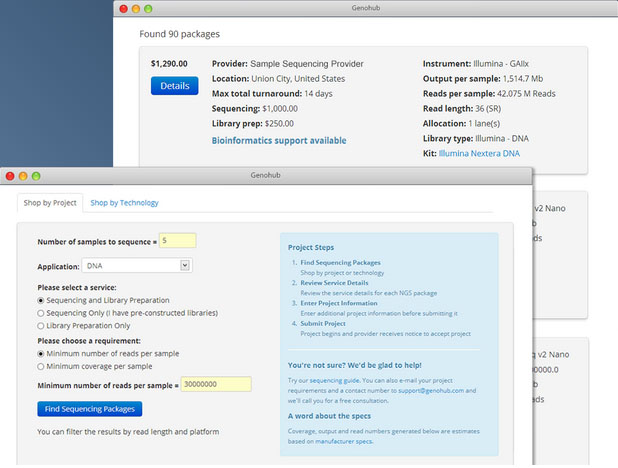Genohub: A NGS Services Marketplace Aiming for Transparency

A new Next Generation Sequencing (NSG) marketplace called Genohub is making it easier than ever for researchers to order sequencing services. The increasing need for next-generation sequencing in laboratories and the boom in the number of NGS providers led to Genohub, a directory of intelligently packaged NGS providers that help researchers in comparing services and prices offered with just a few clicks based on their requirements.
According to its founder, Pouya Razavi, Genohub is aiming to do for genomics what Kayak did for the airline travel industry, bringing transparency to NGS sourcing industry and therefore bringing the costs down. All NGS platforms such as Illumina, Ion Torrent, PacBio, Roche454 and SOLiD are available
Researchers Benefits:
Although other market places and directories such as ScienceExchange and BluSeq (AllSeq) exist, they require users to go through a manual back-and-forth bidding system, resulting in wastage of time for both researchers and the providers. There are hundreds of NGS provides with different technologies, turnaround times, specialties and who all charge different rates. Genohub streamlines the process of choosing a NGS provider by making the selection a one step form filling process and the pricing structure transparent in an Amazon/Kayak like purchasing experience. Users can filter out the providers based on price, the kind of services/technologies they need and the turnaround times they expect. After identifying a service provider, they can pay for the service via Genohub (payment is held on to until the job is completed) and ship their samples. Genohub also guarantees guaranteed turnaround times, by pushing the sequencing providers to abide by their sequencing times or face a cost penalty (not sure who gets to keep the money). The data is made available via a single private page between the researcher and the service provider, where the status of the order can be tracked. For those new to NGS, Genohub provides free consultation services to help them select sequencing packages and designing their experiments.
Provider Benefits:
Providers like researchers are also frustrated by numerous back-and-forth bidding process, most of which lead to nothing. Genohub provides them a platform where they can find informed customers who can ship their samples to the provider and get their credit cards authorized by Genohub. Users are only charged after the provider completes the sequencing satisfactorily. Since unused epuipment is a big concern for providers, using Genohub they can keep their equipment running most of the time. This way they can achieve a favorable return for their investments, by attracting orders from all over the world and provide one time offers.
According to one provider, Kelvin Chan of Seqmatic, “Genohub provides a user friendly platform for researchers to connect with service providers, enabling users to quickly find the services they require without needing to deal with a time consuming quote process. For providers, Genohub provides powerful tools to manage projects and services as well as offering a simple platform for payment.”
Currently Genohub provides a marketplace for NGS services such as library construction, next gen sequencing and bioinformatics analysis, with future of Genohub focused on making sense of these sequences.
Genohub is ushering in a new era of transparency in the NGS pricing space, which will indeed bring about changes. However, what kind of changes will it bring, we are unsure. The Kayak model they are following might have succeeded in bringing down airplane travel costs, however those rates came down at the cost of quality of service, something that would be detrimental to sequencing. Another way they could further streamline NSG is by selling provider authorized DNA/RNA preparation kits. We did however miss rating and user reviews in the provider information, which could make decision making much easier. Other than that Genohub looks like a great way to simplify next gen sequencing.


